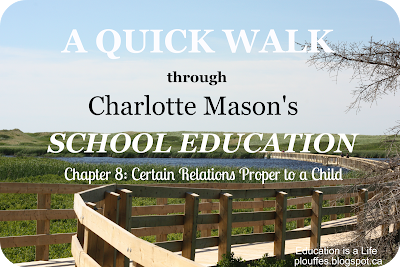This blog post is part of an on-going daily series this month as I read (very quickly) through School Education by Charlotte Mason. Join me! Pick up your book and read a chapter, or find it free online at Ambleside Online.
Summary
What are the "Relations proper to a child"?
Relationships with the universe - Scientific knowledge gained first-hand, the ability to move freely and gracefully in many different ways, the ability to make with their hands using its materials, understanding of and kindness to animals.
Relationships with people -
Relationships of love, obedience, duty, friendship, and kindness with many kinds of people of all places and times. These relationships can be personal, through daily life, languages, and travel. They can also be mind to mind through living books of history and literature, art and archaeology. And we must not neglect a child's relationship with himself: some knowledge of philosophy and psychology will help him to understand himself and other people.
A Relationship with God - A relationship of love and service based not only on sentiment, but on an understanding that this is what we owe to God. An "intimate, ever-open, ever-cordial, ever-corresponding relation with Almighty God, which is the very fulfillment of life; which, whoso hath, hath eternal life;..." (p. 90)
Quotes
"There are...dynamic relations to be established. He must stand and walk and run and jump with ease and grace. He must skate and swim and ride and drive, dance and row and sail a boat. He should be able to make free with his mother earth and to do whatever the principle of gravitation will allow. This is an elemental relationship for the lack of which nothing compensates." (p. 79-80)
"He should be able to make with his hands and should take delight in making." (p. 80)
Intimacy with animals: "a relation of intelligent comprehension as well as of kindness." (p. 80)
"Perhaps the main part of a child's education should be concerned with the great human relationships, relationships of love and service, of authority and obedience, of reverence and pity and neighbourly kindness; relationships to kin and friend and neighbour, to 'cause' and country and kind, to the past and the present. History, literature, archaeology, art, languages, whether ancient or modern, travel and tales of travel; all of these are in one way or other the record or the expression of persons; and we who are persons are interested in all persons,..." (p. 80-81)
"It rests with us to give the awakening idea and then to form the habit of thought and of life." (p. 81)
"...there seems good reason to believe that the limit to human intelligence arises largely from the limit to human interests, that is, from the failure to establish personal relations on a wide scale with the persons who make up humanity, --relations of love, duty, responsibility, and, above all, of interest, living interest, with the near and the far-off, in time and in place." (p. 82)
"I think we should have a great educational revolution once we...realised ourselves as persons whose great business is to get in touch with other persons of all sorts and conditions, of all countries and climes, of all times, past and present.... We should tend to become responsive and wise, humble and reverent, recognising the duties and the joys of the full human life."
"...when our ideal for ourselves and for our children becomes limited to prosperity and comfort, we get these, very likely, for ourselves and for them, but we get no more." (p. 83)
"If you ask, 'But how are we to get a scheme of ethical teaching for our children?' I really do not know, if we choose to forego the Ten Commandments and the old-fashioned teaching of exposition and example founded upon them. There are a thousand supplementary ways of giving such teaching; but these are apt to be casual and little binding if they do not rest upon the solid foundation of duty imposed upon us by God, and due to each other, whether we will or no. This moral relation of person to person underlies all other relations." (p. 85)
"...our power to conduct our relations with other people depends upon our power of conducting our relations with ourselves. Every man carries in his own person the key to human nature, and, in proportion as we are able to use this key, we shall be tolerant, gentle, helpful, wise and reverent." (p. 86)
"But duty and sentiment are two things. Sentiment is optional; and young people grow up to think that they may believe in God, may fear God, may love God in a measure--but that they must do these things, that there is no choice at all about the love and service of God, that it is their duty, that which they owe, to love Him 'with all their heart, with all their mind, with all their soul, with all their strength,' these things are seldom taught and understood as they should be. Even where our sentiment is warm, our religious notions are lax; and children, the children of good, religious parents, grow up without that intimate, ever-open, ever-cordial, ever-corresponding relation with Almighty God, which is the very fulfilment of life; which, whoso hath, hath eternal life; which, whoso hath not, is, like Coleridge's 'lovely Lady Geraldine,' ice-cold and dead at heart, however much he may labour for the free course of all other relations." (p. 90)
